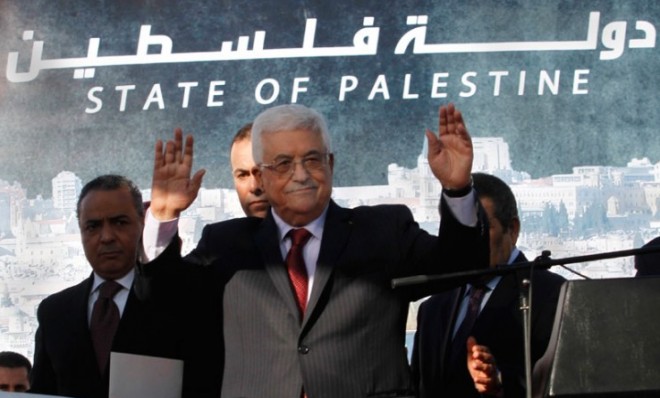'Palestine': What a new name means for the West Bank and Gaza
The Palestinian Authority has given itself a new name — the State of Palestine. Is this a step toward making recognition at the U.N. a reality?


A free daily email with the biggest news stories of the day – and the best features from TheWeek.com
You are now subscribed
Your newsletter sign-up was successful
Palestinian President Mahmoud Abbas is flaunting the United Nations General Assembly's recognition of the Palestinian territories as a state, by announcing that his Palestinian Authority will be called the "State of Palestine" from now on. Abbas ordered that all official documents issued by his administration, which controls the West Bank, will be stamped with a new logo to mark the change. Israeli leaders are still fuming over Abbas' power play at the U.N. in November, as previous agreements established that a Palestinian state could only be created through a negotiated peace deal with Israel, so this latest move risks fanning tensions in the Middle East.
Don't worry too much, says The Associated Press. "Scrapping the old 'Palestinian Authority' logo is as far as Abbas is willing to go in provoking Israel." He's not going to rush to give his people new passports and ID cards, which they need to pass through Israeli border crossings. If anything, the "modesty" of the "move to change official stationery" shows how little power Abbas really has.
Abbas won overwhelming U.N. General Assembly recognition for a State of Palestine in the West Bank, Gaza and east Jerusalem in late November, a rare diplomatic victory over a sidelined Israel. The U.N. nod was important to the Palestinians because it affirmed the borders of their future state in lands Israel captured in 1967.Recognition, however, has not transformed the day-to-day lives of Palestinians, and some argue that it made things worse. In apparent retaliation for the U.N. bid, Israel in December withheld its monthly $100 million transfer of tax rebates it collects on behalf of the Palestinian Authority, further deepening the Abbas government's financial crisis. [Associated Press]
After his big win at the U.N., "you might imagine that the Palestinian Authority (or 'State of Palestine') would do something to make a reality of its new status," says David Frum at Canada's National Post. And there are plenty of ways his self-rule government could have tried to build on his success.
The Week
Escape your echo chamber. Get the facts behind the news, plus analysis from multiple perspectives.

Sign up for The Week's Free Newsletters
From our morning news briefing to a weekly Good News Newsletter, get the best of The Week delivered directly to your inbox.
From our morning news briefing to a weekly Good News Newsletter, get the best of The Week delivered directly to your inbox.
It might seek direct negotiations with Israel. It might advance a proposal for a final settlement. It might initiate confidence-building measures or suggest new areas for useful cooperation between Israelis and Palestinians. But did he follow with something concrete? "No, nix, not."
The PA ("State of Palestine") seems to have no plan at all to make a reality of its proud words...The decision of the leaders of the Palestinian Authority ("State of Palestine") to forgo the responsibilities of nation-building for the flim-flam of state ceremonies only extends and deepens those deprivations all the longer, and all the more unnecessarily. [National Post]
"If Palestine is to have a bright future," says Gulf News in an editorial, Abbas and his Fatah faction and Hamas, which runs the Gaza Strip, have to "stop their feud." Unless they present a united front — holding and respecting national elections, for starters — they can never step forward as one government "with a popular mandate," which is what they need to negotiate with Israel from a position of strength. Until they do, they'll remain two aspiring states within an aspiring state.
The more secular Fatah with its support of negotiations with the Israelis and the Islamist Hamas with its rejection of direct talks, need to come back to being two political parties in one Palestinian state. They do not need to agree on everything, but they do need to agree on both being part of one Palestine. [Gulf News]
A free daily email with the biggest news stories of the day – and the best features from TheWeek.com
Harold Maass is a contributing editor at The Week. He has been writing for The Week since the 2001 debut of the U.S. print edition and served as editor of TheWeek.com when it launched in 2008. Harold started his career as a newspaper reporter in South Florida and Haiti. He has previously worked for a variety of news outlets, including The Miami Herald, ABC News and Fox News, and for several years wrote a daily roundup of financial news for The Week and Yahoo Finance.
-
 American universities are losing ground to their foreign counterparts
American universities are losing ground to their foreign counterpartsThe Explainer While Harvard is still near the top, other colleges have slipped
-
 How to navigate dating apps to find ‘the one’
How to navigate dating apps to find ‘the one’The Week Recommends Put an end to endless swiping and make real romantic connections
-
 Elon Musk’s pivot from Mars to the moon
Elon Musk’s pivot from Mars to the moonIn the Spotlight SpaceX shifts focus with IPO approaching
